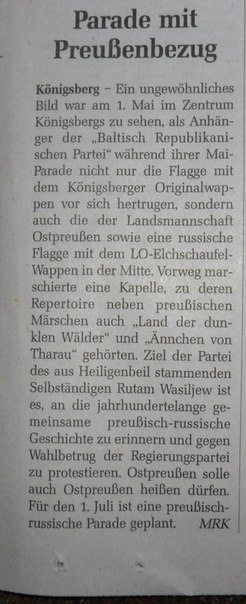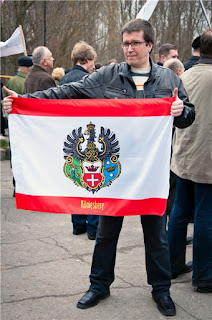by
Andrew M Bergman
Growing
up in the latter half of the 20th Century, depending on where you
happened to be in the world, it was often neither popular nor PC if you were saddled
with a niggling identity that included the historically taboo epithet “Prussian”.
Recent
online debates on the subject have added it to the agenda in the minds of
many, across the full spectrum of the political landscape. In 2012, anyone
prepared to offer a cut-and-dried answer to that question is either a fool or
historically illiterate.
From a
purely de jure historical
perspective, Prussia was effectively abolished in 1932 and ceased to exist in
1947. Therefore, while many born after the latter date may claim to be
“Prussian” by clear ancestry, descending from the original Prussian tribes has
long ceased to be a prerequisite.
The
first time I heard the term “Prussian” was from my father who, as a liberal Jew
fled from his birthplace of Königsberg to the Netherlands in 1933 and thence to
South Africa in 1936. He then served in Her Majesty’s South African Forces in
WWII in North Africa, Italy and Palestine. He was at pains (for obvious
reasons) to de-emphasise his “German-ness” and officially removed the second
“n” from Bergmann. “Bergman” is comfortably Dutch or Swedish.
He didn’t
talk much of his experiences during the war, but one conversation – probably related
over the chessboard at which he usually whipped my ass – is burned onto my
brain.
While
his English was near-native in its correctness, Dad always retained a German
accent. He never went into any detail, but related how, while moving between
Prisoners of War after Montgomery’s occupation of Tobruk, he encountered Afrika Korps men
who had been at school or college with him. Predictably, during the war and
thereafter, comrades and friends had asked him how he felt about “a German fighting
against the Germans”. He had a standard answer that might sound glib, but while
apologists might dismiss the semantics of it, it was uttered with profound
conviction and had a deep impact on my own feeling of identity: “I was never a
German fighting the Germans. I was only ever Prussian fighting the nazis”. And
then if anyone pointed out: “A Prussian Jew,” he would be quick to retort: “I
prefer to consider myself a Jewish Prussian.”
specially
after the war, while the fact that the nazis (probably just like the Afrika Korps, occasionally represented by men who were at school or college with him) had herded his mother and father
(who carried the rank of Colonel and held the Iron Cross 1st
Class)
and countless uncles, aunts and cousins into the gas chambers of
Auschwitz, Majdanek, Trebinka, Sobibor etc. as “Jews” understandably
prompted him to
reject any vestige of a “German” identity, down to the point of never
teaching
or speaking the language to me. Somehow, though, he seemed to have felt
no less “Prussian”. As a
child of the 1960s, the distinction was to lie in ambush until after I’d
fought
my own war in Africa.
It was
about two hours, fifteen minutes and 24 seconds into my compulsory military
service in South Africa that I realised the benefit of having a Prussian father
with several generations of hussars in the family tree. I used to joke as a
teenager: “My father’s not my father, he’s my Sergeant Major.” Suffice to say
that he’d taught me to temper my rebellious nature, taught me to say Yes Sir! convincingly so I took to military life a
fish to water.
Towards
the end of his life, by which time I was a cadet reporter on the local daily
with far less reason to temper any rebelliousness, we happened to be watching
the TV news together when an item appeared showing some or other neo-nazi
manifestation in Germany. Groups of leather-clad yobs shouted fascist slogans,
while carefully avoiding actual nazi chants (which would get them arrested
immediately in Germany today) and not displaying any swastikas or SS runes for the
same reason. “See,” Dad said, pointing to a particularly beer-bloated skinhead who
was waving the Imperial War Ensign while bellowing inarticulately, “they can’t
display their Hakenkreuz so they’ve
hijacked our flag, and here they are,
dragging it through the mud. It’s going to be up to your generation to take it back and restore its honour”.
 |
During WWI, the similarity between the British White Ensign and the German War Ensign
caused so many "friendly fire" incidents in the poor light of the English Channel and the
North Sea that Royal Navy ships took to flying the Red (Merchant) Ensign. |
Dad’s
story is one of countless similar ones that live on in the aural history of
individuals, but alas, mainstream history is written (at best tinged and at
worst biased) by the victors, undeniably for the masses. Those who have studied
history will appreciate that “Prussia” has, for worryingly illogical reasons,
become (erroneously) associated with an undereducated fascist minority and
thence the whipping boy blamed for WWI and much of the nationalistic militarism
that resulted in WWII. The example of the likes of Claus Von Stauffenberg (a Schwabian
with Prussian roots) is the exception that proves the rule.
Then,
some history is selectively and retrospectively un-written. It’s seldom prominently
mentioned (usually tucked away in paragraph 51 of page 6 of chapter 17) in (English-language)
accounts of the Battle of Waterloo: The fact that Wellington’s victory was by
no means secure until the arrival of the eccentric (code for: mad as a bucket
of frogs) and brilliant (the two so often cohabit) General Gebhard Leberecht
von Blücher with fresh PRUSSIAN troops! Curiously, the Hanoverians and Hessians
etc. who fought suffer no such violence at the hands of post-1914 historical
editors.
But the
question remains: Who are the Prussians today? For unless you are deluded, you
can’t wipe-away the identity of an entire nation with the stroke of a (un)diplomatic
pen.
Feeling
“Prussian” is complex, especially considering the water - and considerable
quantities of blood - that have flowed under the proverbial bridge in our name.
And as
always, the facts are far more subtle.
Prussia’s
enlightened “founding Father”, Emperor Frederick the Great – arguably the first
monarch in history to achieve a state of inward military preparedness without
outward bellicosity – who composed the Hohensalzburger
Marsch to commemorate his (militarily unpredicted) victory over the Austrians
– must have done double-back-flips in his grave when he saw what was
perpetrated from ’33 to ’45 for “Germanic supremacy”, often “in his name” by
the cohorts of a (very dangerous) little Austrian corporal.
In
reality, Emperor Frederick was a consummate composer, an able musician
(specifically on the flute) and a committed Freemason who, repeatedly in his
many writings which
should be read in the vernacular of the zeitgeist, extolled the benefits of
multiculturalism and raised questions that Western Europe and the World are
still wrestling with today. In basic terms, he asserted that a monarch (leader)
should not show clear allegiance to one or other political or religious group,
lest it alienate the others. And the strength of an Empire is in its diversity.
So in
2012, who is a Prussian? You’ll get different answers from anyone you ask. It
has interesting commonalities (and comparable infinity in its answers) with the
questions: who is an Englishman/Frenchman (perish the thought we open the can
of dragon larvae that’s labelled: “who is a Jew?)
So, is
a Prussian someone who can trace his/her ancestry back to the pre-Germanic
Prussian tribes? Undeniably and quintessentially yes!
Is a
Prussian a descendant of the Germans, Poles, Balts etc. who either settled or
were “resettled” there over the centuries and came to call it home? Yes!
Is a
Prussian someone with Russian ancestry who was born in Kaliningrad yet strives
for modern western-looking democratic ideals? Yes!
Is a
Prussian someone whose philosophy of multicultural harmony and mutual cultural
respect mirrors that of Emperor Frederick the Great? Certainly!
When
considering the above, the only conclusion I can come to is that in 2012,
whoever considers themselves to be a
Prussian must be embraced as a Prussian. When they return from the diaspora of
the 20th Century (don’t expect them to come back in droves, at least
not initially), most will still “look Prussian”, but it would be naïve to
ignore that East Prussians cast far and wide will certainly have resulted in
some who might have an Asian, African or other ethnic “look”, while still
nurturing a sincere and zealous East Prussian loyalty and/or identity.
History
has
made ethnicity irrelevant – you can no more judge the quality of a
human
being from the colour of their skin than you can from the colour of
their eyes,
or the books they hold sacred. Nor can I hold any man guilty of the
crimes his father might have committed against mine. We can't look
backwards 'cause like it or not, none of us is going that way. So In my
book:
1)
Whoever
would go to the barricades for democratic freedom of self-determination for
what Moscow calls the “Oblast of Kaliningrad” is a Prussian.
2)
Whoever
would step forward to govern (or just to contribute) once the occupation of
Moscow is lifted (or if necessarily overthrown), that is a Prussian!
3)
In the spirit of Frederik the Great, we will keep our gloves clean to
extend the hand of friendship to all who will take it, but we will keep
our swords sharp to defend ourselves against those who will not.
Count
me in on all of the above.
Ich bin ein Preuße, kennt
ihr meine Farben?
































